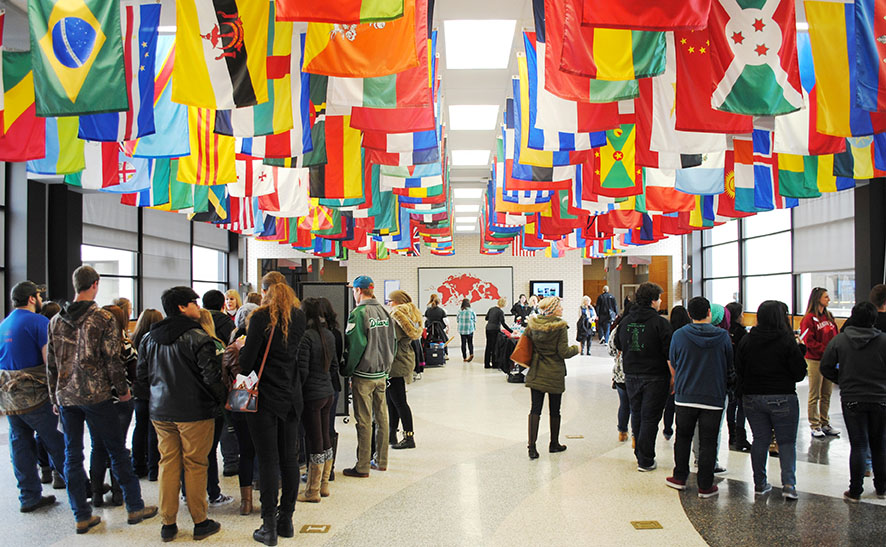
FAYETTEVILLE, Ark. – Area high school students who receive career- and college-readiness coaching from University of Arkansas graduate students are more likely to have enrolled in college than students who do not participate in the program called Razor C.O.A.C.H.
Those are some of the findings in a new report on results of two years (2012-13 and 2013-14) of Razor C.O.A.C.H., an acronym for Creating Opportunities for Arkansans’ Career Hopes. The program is based in the College of Education and Health Professions and hires master’s students in the college’s counselor education program. Researchers are collecting data from the third year (2014-15) now and expect to release those findings in January.
Researchers used National Student Clearinghouse data to examine the post-secondary activities of students who took part in Razor C.O.A.C.H. and compare the results to those of students in a control group chosen at random. According to the report, 44 percent of the Razor C.O.A.C.H. students in the program during the 2013-14 school year enrolled in college compared to 36 percent of the control students.
“These results are very important because they are the first sources of information on whether the program is actually meeting one of its long-term goals of encouraging more students to enroll in and succeed in post-secondary educational institutions,” said Josh Raney, director of Razor C.O.A.C.H.
In addition to collecting administrative data from the high schools, the researchers surveyed students to address several questions related to what they called non-cognitive outcomes such as attendance, discipline and self-perception constructions such as self-efficacy, future-mindedness, responsibility and engagement, grit and external accountability.
Students who participated in the program exhibited significantly higher scores on the non-cognitive survey measures than students who did not participate in it, although a measure of academic outcomes such as GPA and credits earned showed little difference between the two groups. However, Raney said, specific grade levels of Razor C.O.A.C.H. students did earn more credits than students not in the program.
“Also, GPA at specific schools did improve more than the control group,” Raney said. “Outcomes of the Razor C.O.A.C.H. program related to these measures are also consistent with outcomes of other college- and career-readiness programs.”
Coaches work 20 hours per week at schools in Benton and Washington counties. In addition to working with the students at school, the program hosts campus visits to the University of Arkansas and NorthWest Arkansas Community College and evening events at the U of A campus that focus on financial aid information prospective college students need.
Additional Survey Results
- Razor C.O.A.C.H. students believed that they could do well in academic pursuits.
- Razor C.O.A.C.H. students have given more thought to colleges and careers in their future.
- Razor C.O.A.C.H. students were more likely to believe that an adult at the school would hold them accountable for academic success.
- Razor C.O.A.C.H. students had higher levels of external support for college career planning.
- Razor C.O.A.C.H. students had greater knowledge of the steps required in college applications, a stronger belief that they would attend college and reported having completed more of the necessary steps toward gaining admission to college.
About Razor C.O.A.C.H.: Razor C.O.A.C.H. is a collaboration between the College of Education and Health Professions at the U of A; the Northwest Arkansas Council; the Walton Family Foundation, which provided $1.5 million over the three-year period; and Northwest Arkansas school districts and the education service cooperative. The U of A counselor education academic program houses Razor C.O.A.C.H.
About the University of Arkansas: The University of Arkansas provides an internationally competitive education for undergraduate and graduate students in more than 200 academic programs. The university contributes new knowledge, economic development, basic and applied research, and creative activity while also providing service to academic and professional disciplines. The Carnegie Foundation classifies the University of Arkansas among only 2 percent of universities in America that have the highest level of research activity. U.S. News & World Report ranks the University of Arkansas among its top American public research universities. Founded in 1871, the University of Arkansas comprises 10 colleges and schools and maintains a low student-to-faculty ratio that promotes personal attention and close mentoring.
Topics
Contacts
Josh Raney, director, Razor C.O.A.C.H.
College of Education and Health Professions
479-575-5429,
Heidi Wells, content writer and strategist
Global Campus
479-879-8760,